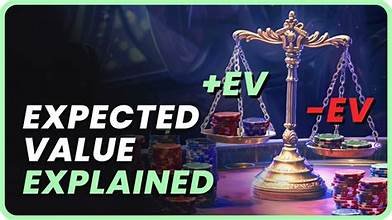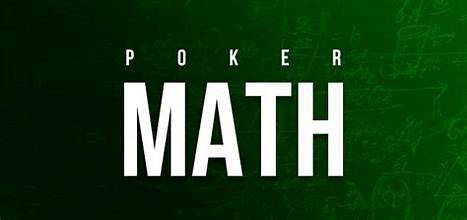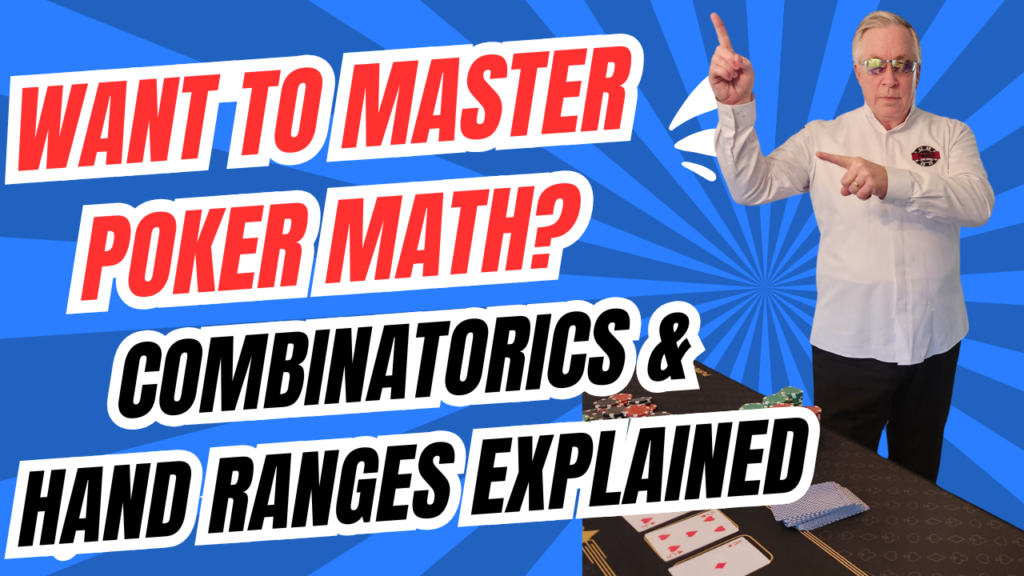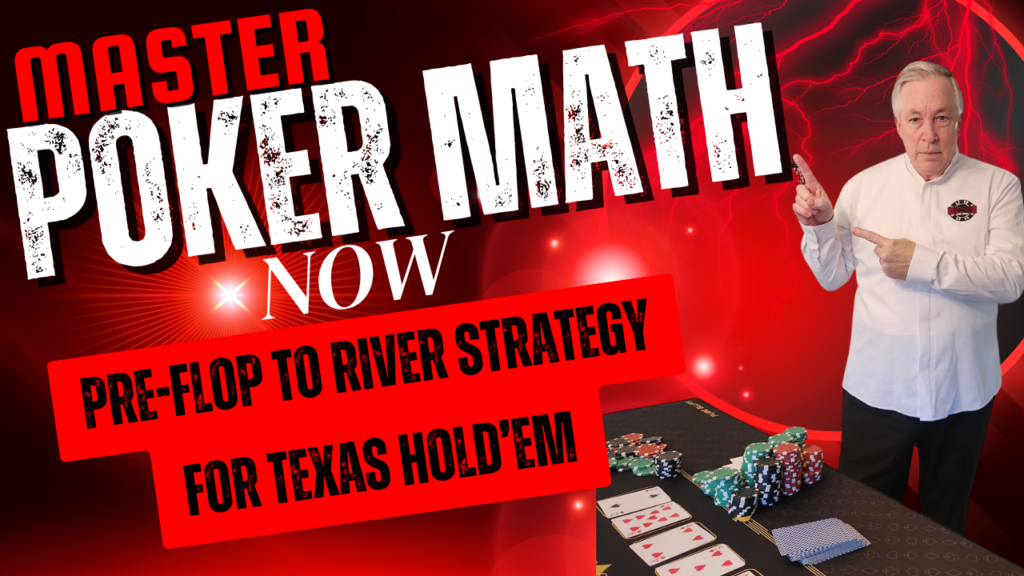EXPECTED VALUE IN POKER
Home » Mastering Expected Value In Poker
A GUIDE TO SMARTER DECISION MAKING
In poker, every decision you make impacts your long-term profitability. Whether it’s calling a bet, folding a hand, or going all-in, the key to consistent success lies in understanding and applying Expected Value (EV). EV is more than just a mathematical formula; it’s a tool that separates skilled players from the rest. By calculating the potential outcomes of a play and weighing their probabilities, you can make decisions that are profitable over time, even when individual hands don’t go your way. In this article, we’ll explore the concept of Expected Value and how it shapes professional poker strategy. From basic definitions to real-world examples, we’ll guide you through the process of using EV to elevate your game. Whether you’re a beginner or an experienced player, mastering EV will give you the edge you need to thrive at the tables.
WHAT IS EXPECTED VALUE?
Expected Value (EV) is the foundation of all strategic decision-making in poker. At its core, EV quantifies the profitability of a decision over the long run by calculating the average result of that decision if it were repeated many times. It’s a way to move beyond gut instincts and emotion, relying instead on mathematical precision to guide your choices.

BREAKING DOWN THE CONCEPT OF EXPECTED VALUE (EV)
Expected Value evaluates both the potential rewards and risks of a decision. It does this by combining two key elements:
- Probability of Outcomes: The likelihood of different results, such as winning or losing a hand.
- Potential Payouts or Losses: The amount you stand to win or lose for each outcome.
The formula for EV looks like this:
EV = (Probability of Winning x Amount Won) minus (Probability of Losing x Amount Lost)
By calculating these factors, you can determine whether a decision will be profitable over the long term. While short-term results may vary due to variance, EV ensures that your decisions are rooted in sound strategy.
Example: The Coin Flip Analogy
To understand EV more clearly, let’s step away from poker for a moment and consider a simple coin flip game. Imagine the following rules:
- You win $2 if it lands on heads.
- You lose $1 if it lands on tails.
The probabilities are equal: 50% for heads and 50% for tails. Using the EV formula:
EV = (0.50 x $2) – (0.50 x $1)
EV = $1 – $0.50 = $0.50 Positive EV
This result means that, on average, you would expect to profit $0.50 per flip. While individual flips might result in a win or a loss, over hundreds of flips, your average profit per flip would converge toward $0.50.
WHY EXPECTED VALUE IS CRUCIAL IN POKER
In poker, EV applies to every decision—whether it’s calling, folding, betting, or raising. Each action can be evaluated based on the probabilities of different outcomes and their respective payoffs or losses. By consistently making +EV (positive Expected Value) decisions and avoiding -EV (negative Expected Value) ones, you create a strategy that thrives over the long run.
EV transforms poker from a game of chance into a game of skill, rewarding those who make thoughtful, mathematically sound choices.
APPLYING EXPECTED VALUE IN POKER
Expected Value (EV) is a crucial concept that applies to various scenarios at the poker table. This section will explore how EV influences decision-making in real-world situations, from flush draws to semi-bluffs and all-in decisions.
CALLING WITH A FLUSH DRAW
SEMI BLUFFING WITH A DRAW
You hold A♦5♦, and the board is K♦4♦10♥. The pot is $200, and your opponent bets $100. Should you call? Flop Analysis:
- Odds of Completing the Flush on the Turn: With 9 outs, the probability of hitting the flush on the turn is 6% (roughly 4.1-to-1 odds).
- Pot Odds: Before your call, the pot is $300 ($200 existing + $100 opponent’s bet). Calling $100 gives pot odds of 3-to-1 ($300/$100). These odds are less favorable than the odds of completing the flush on the turn alone (4.1-to-1), making this call unprofitable in the long term.
Total Hand Probability:
The combined probability of completing the flush by the river is 35% (or 0.85-to-1). However, since this is not an all-in situation, you must evaluate each street independently, as the opponent will likely bet again on the turn if you miss. These future bets impact the EV of your decision.
Implied Odds Consideration:
If you believe your opponent will call a sizable bet when you complete your flush, implied odds can justify the call. Implied odds refer to the additional money you expect to win on future streets if your draw completes. For a deeper dive into implied odds, check out our dedicated article linked here.
Key Takeaway: While the total probability of completing your flush might make this scenario seem profitable, EV calculations should consider each street and the potential for future bets.
.
You hold Q♥J♥, and the board is 10♥6♥4♠. The pot is $150, and your opponent bets $50. Should you raise as a semi-bluff? Turn Analysis:
Hand Equity on the Turn: With 9 outs to
the flush, your equity for the turn alone is 19.6% (roughly 4.1-to-1
odds). For both the turn and river, your equity increases to 35%.
Fold Equity Consideration: Raising as a
semi-bluff relies on fold equity—the likelihood your opponent will fold to your
raise. If you raise to $150 and your opponent folds 40% of the time, the play
becomes profitable.
EV Calculation:If Opponent Folds (40%): You win the $200 pot outright. If Opponent Calls (60%): You rely on your equity (35%) to win the $450 pot after your raise. This adds: $450 X0.35 = $157.50 in potential winnings.
Expected Value Formula
EV = (P(Fold) x Pot)+(P(Call)xHand Equity)-(P(Call) x Amount Raise)
Expected Value = (0.4x$200)+(0.6x$157.50)-(0.6x$150)
EV = $80+$94.50-$90
Expected Value = $+84.50
The Semi-bluff is a profitable play here, combining fold equity and hand equity to create a positive EV of $84.50.
ALL IN DECISION WITH A MONSTER DRAW
You hold 8♠9♠, and the board is 6♠7♠J♦. The pot is $500, and your opponent shoves for $300. Should you call?
Outs and Probabilities:
You have a straight, flush, and straight-flush draw:
- 9 Spades (flush outs)
- 4 Fives (straight outs)
- 4 Tens (straight outs)
- Adjust for overlap: 2 of the straight outs (5♠ and 10♠) are also flush outs.
- Total Outs: 15.
- Turn Probability: 15 outs ÷ 46 unseen cards = 32% (roughly 2.13-to-1 odds).
- River Probability: If you miss on the turn, 15 outs ÷ 45 unseen cards = 33% (roughly 2.07-to-1 odds).
- Combined Probability: 54% (or 0.85-to-1 odds).
Pot Odds:
Before your call, the pot is $500 + $300 = $800. Calling $300 gives pot odds of 2.66-to-1 and brings the total pot to $1,100.
EV Calculation:
- If You Win (54%): You win the $1,100 pot
- $1,100 × 0.54 = $594
- If You Lose (46%): You lose your $300 call.
- $300 × 0.46 = $138 EV Formula: EV=(Probability of Winning x Total Pot)-(Probability of Losing x Amount Called)
- EV = $1,100×0.54)-($300X0.46) EV = $597-$138=+456 Expected Value
- With a monster draw and strong pot odds, this is a highly profitable call.
SUMMARY FOR APPLYING EXPECTED VALUE IN POKER
EV calculations require evaluating probabilities, pot odds, implied odds, and opponent tendencies. By breaking down each scenario step by step, you can identify +EV decisions and avoid costly -EV mistakes, building a solid foundation for long-term profitability.
WHAT IS POSITIVE EXPECTED VALUE?
A decision is considered to have positive EV if, over the long term, it results in a net profit. This is the essence of poker strategy—making plays that generate value consistently over hundreds or thousands of hands. Let’s explore an example that incorporates implied odds to turn a marginal call into a profitable one.
Example with Implied Odds
Scenario: You hold Ace of Diamonds and the Jack Of Diamonds. The board is King of diamonds, 8 of spades and the 4 of diamonds. The pot is $300, and your opponent bets $100. You estimate that if you hit your flush, your opponent will likely call an additional $200 on the river. (Implied Odds)
- Pot Before Call: $300.
- Your Call: $100.
- Potential Total Pot with Implied Odds: $300 + $100 + $200(River Bet – Implied Odds) = $600 total pot won.
Calculating EV:
- Flush Odds: The probability of hitting the flush on the river is 19.6%, or approximately 4.1-to-1.
- Probability of Winning: 19.6%, or 0.196.
- Probability of Losing: 80.4%, or 0.804.
EV = (Probability of Winning × Total Pot) − (Probability of Losing × Amount Called)
EV = (0.196 × $600) − (0.804 × $100) EV = $117.60 − $80.40 EV = +$37.20
Key Takeaway: Without implied odds, the call would have been negative EV. However, the additional $200 from implied odds shifts the decision to a profitable one. This demonstrates how implied odds can impact decision-making, but it’s crucial to estimate them realistically based on opponent tendencies, pot odds, hand probabilities and table dynamics.
WHAT IS NEGATIVE EV?
A decision is considered to have negative EV if, over the long term, it results in a net loss. These are the plays that, while tempting in the moment, cost you money in the big picture. Let’s analyze why implied odds rarely justify weak draws, such as inside straight draws.
Example of an Inside Straight Draw
Scenario: You hold 9♠8♠, and the board is 7♣ 5 of diamonds Q♥. The pot is $300, and your opponent bets $100. Should you call?
- Gutshot Odds: Probability of hitting your straight is approximately 8.5%, or 10.76-to-1.
- Pot Odds: $400 (pot after the opponent’s bet) ÷ $100 (your call) = 4-to-1.
Analyzing the EV:
EV = (Probability of Winning × Total Pot) − (Probability of Losing × Amount Called)
EV = (0.085 × $400) − (0.915 × $100) EV = $34 − $91.50 EV = −$57.50
Even if you estimate implied odds by assuming your opponent will call an additional $200 if you hit, the math doesn’t save this play:
- Total Pot with Implied Odds: $400 + $200 = $600.
- Adjusted EV = (0.085 × $600) − (0.915 × $100) EV = $51 − $91.50 EV = −$40.50
Key Takeaway: Even with generous implied odds, calling with a gutshot straight draw remains negative EV. Avoid these plays unless the dynamics overwhelmingly favor it.
LONG -TERM IMPACT OF EXPECTED VALUE
RECOGNIZING EXPECTED VALUE AT THE TABLE
Understanding the difference between positive and negative EV is vital, but the true power of EV lies in its long-term impact. Poker involves variance, and even the best decisions won’t always yield immediate results. What separates winning players is their commitment to making +EV decisions consistently over time.
Graphing the Journey:
Imagine a graph where the trendline for +EV decisions moves upward over thousands of hands, even as short-term results fluctuate. This visual underscores the importance of trusting the math and focusing on decision quality rather than short-term outcomes.
Key Takeaway: Stick to +EV plays and avoid -EV ones. Over the long run, the math will work in your favor.
Spotting EV opportunities in real time is one of the hallmarks of a skilled poker player. Let’s examine a scenario involving a low-ranking flush draw to highlight the importance of contextual decision-making.
Example of an 8-High Flush Draw
Scenario: You hold 8♠6♠, and the board is K♠9♦2♠. The pot is $200, and your opponent bets $100. Should you call?
- Flush Odds: Probability of completing the flush on the turn is 19.6%, or 4.1-to-1.
- Pot Odds: $300 ÷ $100 = 3-to-1.
Considerations Beyond Math:
- Competing Flush Draws: In a 9-handed game, there’s a 35% probability another player also holds two spades, potentially with a higher flush.
- Player Tendencies: Opponent tendencies, table dynamics, and the potential for higher flushes must be weighed before proceeding.
Key Takeaway:
While the math might support a call, low-ranking flush draws carry inherent risks. Consider opponent tendencies, table dynamics, and the potential for higher flushes before proceeding. Decisions should combine mathematical soundness with situational awareness.
POSITIVE EXPECTED VALUE DECISIONS
Positive EV decisions are the cornerstone of profitable poker. By understanding implied odds, avoiding weak -EV plays, and recognizing contextual risks, you can make informed choices that build long-term success at the table. EV isn’t just math—it’s the foundation of strategic poker.

COMMON MISTAKES PLAYERS MAKE WITH ev
MISJUDGING PROBABILITIES
IGNORING POT ODDS
Another major mistake is neglecting to compare pot odds to hand odds before making a decision. Instead, many players rely on instinct or emotional attachment to a hand.
Example:
The pot is $300, and your opponent bets $100, making the total pot $400. Your pot odds are 4-to-1. However, your hand odds for hitting a gutshot straight are 10.75-to-1, making the call a clear -EV decision.
Correct Approach:
- Always calculate your pot odds and compare them to your hand odds before making a decision.
- Factor in implied odds only when you have a realistic expectation of additional payouts.
Key Takeaway:
Pot odds are foundational to EV calculations. Ignoring them is a surefire way to bleed chips.
While implied odds can turn marginal plays into profitable ones, overestimating their impact can lead to poor decisions. This often happens when players assume they’ll always win big if they hit their draw.
Example:
You call a $50 bet on a $200 pot with a gutshot straight draw, expecting to win an additional $200 if you hit. However, your opponent is a tight player who is unlikely to pay off a large bet, making your implied odds far less valuable.
Correct Approach:
- Only factor in implied odds when your opponent’s tendencies support the likelihood of additional payouts.
- Be realistic about the amount you can win on future streets.
Key Takeaway:
Implied odds are useful but not guaranteed. Overestimating them can turn a -EV decision into a costly mistake.
FOCUSING ON SHORT-TERM RESULTS
NEGLECTING OPPONENT TENDENCIES
Poker involves variance, and even the best +EV decisions can lose in the short term. However, some players let short-term results dictate their strategy, abandoning sound decision-making.
Example:
You make a +EV call with a flush draw but miss your outs several times in a row. Frustrated, you stop chasing draws altogether, even when the math supports the decision.
Correct Approach:
- Understand that variance is an inherent part of poker. Focus on making consistently +EV plays over the long term.
- Use tools like a bankroll tracker or EV calculator to monitor your long-term profitability.
Key Takeaway:
EV is about the long-term. Trust the math and avoid letting short-term swings affect your decision-making.
Neglecting Opponent Tendencies
EV calculations often assume average conditions, but poker isn’t played in a vacuum. Failing to adjust for opponent tendencies can lead to suboptimal decisions.
Example:
You bluff into a “calling station” (a player who rarely folds), expecting a fold to make the play profitable. However, their tendency to call makes this a -EV decision, even if the math suggests otherwise.
Correct Approach:
- Observe your opponents’ tendencies and adjust your strategy accordingly.
- Use tighter bluffing ranges against loose players and widen your value range against tight players.
Key Takeaway:
EV calculations are most effective when combined with an understanding of your opponents. Adjusting for tendencies can turn marginal situations into profitable ones—or avoid costly mistakes.
By avoiding these common EV mistakes—misjudging probabilities, ignoring pot odds, overvaluing implied odds, focusing on short-term results, and neglecting opponent tendencies—you can make smarter, more consistent decisions at the poker table. Remember, poker is a long-term game, and mastering EV is the key to sustained success.
HOW TO RECOGNIZE EV AT THE TABLE
Recognizing Expected Value (EV) in real-time is a skill that separates seasoned players from beginners. While the math is fundamental, EV is best applied when combined with observation and an understanding of game dynamics. Identifying EV opportunities requires a mix of quick calculations and situational awareness. Here are some actionable tips to guide your decision-making.
COMPARE POT ODDS TO HAND ODDS
LOOK FOR OPPORTUNITIES TO APPLY IMPLIED ODDS
Before making a call, always calculate the pot odds and compare them to your hand odds. This tells you whether the call is profitable.
Example:
- Pot = $300, Opponent bets $100. Total pot = $400.
- Your hand odds for completing a flush on the next card are 4.1-to-1 (19.6% probability).
- Pot odds = 4-to-1.
Decision: This call is slightly -EV for the turn alone, but if the situation includes implied odds or is all-in, re-calculate accordingly.
Implied odds can turn borderline situations into +EV decisions. Estimate how much more you can win on future streets if you complete your hand.
Example: If your opponent is likely to call an additional $200 when you hit your draw, add this amount to your potential winnings when calculating EV.
Key Consideration: Only factor in implied odds if your opponent’s tendencies suggest they’ll pay off big bets. Against tighter players, implied odds lose their value.
EVALUATE BLUFFING AND SEMI-BLUFFING OPPORTUNITIES
ACCOUNT FOR BOARD TEXTURE
Bluffing and semi-bluffing can generate positive EV when used strategically. The key is understanding how often your opponent is likely to fold versus call.
Quick Calculation for Bluff EV:
- Pot = $150, Bet = $50.
- Probability of opponent folding (P(Fold)) = 40%.
- EV = (P(Fold) × Pot) − (P(Call) × Bet).
- EV = (0.4 × $150) − (0.6 × $50) = $60 − $30 = +$30.
Key Tip: Always consider your opponent’s tendencies. Bluffing against a calling station is rarely profitable, regardless of the math.
The board heavily influences hand ranges and EV. Dry boards (e.g., K♦8♣3♠) favor the preflop aggressor, making bluffs and semi-bluffs more effective. Wet boards (e.g., J♠10♠9♣) increase the likelihood of opponents connecting, requiring tighter ranges for profitable bets.
Key Tip: On wet boards, focus on hands with strong equity or clear blockers to key combinations.
MONITOR BET SIZING
Opponent bet sizing can provide valuable clues about their hand strength and whether a play is +EV or -EV.
Example:
- If an opponent bets large (e.g., 150% of the pot) on a dry board, they’re often polarizing their range between very strong hands and bluffs. Use this information to refine your decision-making.
importance of combining math with observation & game dynamics
While math forms the foundation of EV, poker is ultimately a game of people. Recognizing +EV opportunities requires balancing mathematical calculations with insights into player tendencies and table dynamics.
OBSERVE PLAYER TENDENCIES
ADAPT TO TABLE DYNAMICS
Pay close attention to how your opponents play. Are they tight or loose? Aggressive or passive? Adjust your strategy to exploit their weaknesses.
Example:
- Against loose players, focus on value betting strong hands.
- Against tight players, semi-bluffs and small bluffs can be more effective.
Every table has a unique dynamic. Factors like stack sizes, player styles, and recent hand history can all influence EV.
Example: If the table has been tight, consider widening your bluffing range. If it’s loose, tighten up and prioritize hands with high equity.
USE MEMORY AIDS FOR QUICK MATH
MAINTAIN EMOTIONAL DISCIPLINE
Poker is a fast-paced game, and you won’t always have time for detailed calculations. Use memory aids like the “Rule of 4 and 2” for quick hand odds estimations or shorthand for common pot odds scenarios.
Avoid letting emotions cloud your EV calculations. Tilt can lead to impulsive decisions that ignore the math, turning +EV situations into costly mistakes.
Key Tip: If you feel emotionally compromised, take a break to reset your focus.
Recognizing EV at the table requires more than just math—it demands observation, adaptability, and discipline. By combining quick calculations with insights into player tendencies and table dynamics, you can identify +EV opportunities and avoid costly -EV mistakes. Remember, poker is a game of decisions, and mastering EV is the key to long-term success.
CONCLUSION
Mastering Expected Value (EV) is a journey that transforms poker from a game of luck into a game of strategy and skill. Throughout this article, we’ve explored the core principles of EV, how to calculate it, and its practical applications at the table. From understanding pot odds to recognizing +EV and -EV scenarios, you now have the tools to make more informed decisions.
EV is not just about numbers—it’s about developing a mindset focused on long-term profitability. Whether it’s calling with a draw, making a strategic bluff, or recognizing when to fold, each decision should be grounded in logic, observation, and mathematical soundness. By consistently applying these principles, you’ll gain an edge over opponents who rely solely on instinct or emotion.
Remember, poker is a marathon, not a sprint. Short-term variance is inevitable, but the true measure of success lies in your ability to stay disciplined and trust the math over time. The best players don’t win every hand—they win in the long run by making the right decisions over and over again.
As you continue your poker journey, revisit these concepts often. Practice calculating EV, analyze your plays, and refine your strategy to adapt to different opponents and table dynamics. The more you integrate EV into your game, the more confident and successful you’ll become.
So, the next time you sit at the table, ask yourself: Is this decision EV-positive? That simple question could be the key to elevating your game and building a bankroll that stands the test of time.





